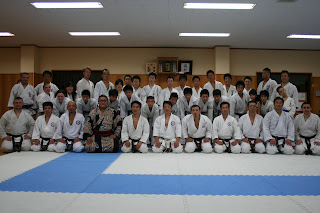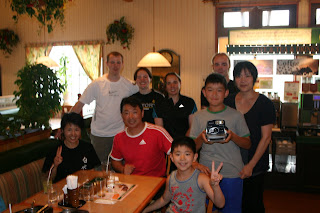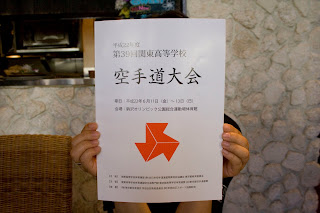
Peter here;
After months of preparation (and dread), the event was finally here: the 46th Wadokai Zenkoku Taikai (Wadokai National Championships). Held over 2 days and in 2 locations, this tournament was filled with more competitors than the World Cup, and with a larger audience as well.
My events were Yukyusha (kyu grade) Kumite and Kata. Why Kyu grade? This is because my dan grade isn't JKF Wadokai verified, therefore for all JKF official tournaments I would be regarded as kyu grade until I pass my JKF wadokai shodan test in Japan. It was not lost on me however, that the last time I wore a brown belt was almost ten years ago to the day (when I earned my shodan), and although I'm not an overly superstitious fellow I was hoping that it would provide the same fortune.

After a very short welcoming speech, the events began. Carl was one of the first competitors up; having rested his knee he felt that he could compete. His knee lasted about 2 minutes into his first round before giving out, but fortunately it wasn't as bad this time; plus Carl was also commanding a very good lead. He held out, and won the bout practically on one leg! Unfortunately the next round wasn't so fortuitous and despite a good effort he was eliminated.
Ladies' Kata was up next, and it was a good turn for all the England Squad and Louise from New Zelaand, everyone getting through. Time for a much warranted pose, back by popular (i.e. Carl's) request:

Kamihamihaaaa! (spelling may differ from actual spelling)

Among the categories was the men's team event, which I had been really looking forward to: Arakawa Sensei was fighting in the team. It's frightening how someone who exudes positivity and a friendly approach can suddenly 'switch' to an aggressive fighting mentality, and this is exactly what I saw. Impressive, but very scary. The Shiramizu team won their rounds to go through to the last 8 in the Nippon Budokan the next day.
As I was with the Kyu grades, I was hoping that my Kumite event would get me to at least the last 8. However, despite a positive first round my second round fell apart. I was in the lead and let it go, which I was very annoyed at myself for (However, as a late concession the fellow who beat me was a finalist the next day, so it wasn't too bad). Kata I was lucky enough to be straight into the last 8, and performing at the Nippon Budokan the next day.

Although I had visited the Nippon Budokan with Arakawa Sensei and Fabien Sensei before, there is very little to compare with actually competing there. The atmosphere is electrifying.

Electrifying quickly turned to petrifying as I learned at 9:30 that my even started at 10am and not 11- I practiced as much as I could, but as Kata is definitely not my strongest point I was semi resigned to failure.
Imagine my surprise then, when I received all 5 flags for my Pinan Godan! I was through to the final, the second tournament in a row!
Unfortunately as I was spending all my time rehearsing Pinan Godan and not a secondary Kata, my Seishan was a mix of nerves and excitement- definitely not my best performance for the final. That said, I was surprised and happy to get one flag in my favour against a very good Kushanku.
So, two tournaments, two silver medals. I feel very lucky.

Louise's category was much more competitive in Women's Individual Black Belt Kata, and she burst through several impressive Kata before narrowly losing out in the semi final.
Katrina Wilson (England's Wadokai Junior Women's Kata World Champion from the weekend before), also ranked in the Bronzes, as did Lee Minion Sensei. Shiramizu's Uchida-san added to the Bronzes with his veteran Kumite category.
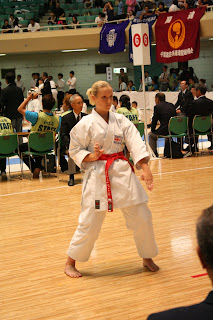
The other finals took place throughout the day, but most of them happened after the interval.
The break in a tournament is a new thing for me, being from England each event just tends to happen subsequently- were there a interval the tournaments would get longer than they are already, which on some particularly disorganized ones can be as late as 8pm. However, in Japan the interval is a requisite for entertainment and demonstrations. For the National Wadokai tournament, Arakawa Sensei leads the hundreds of younger participants of the tournament in some basic drills, while the massive o-daiko drum thumps out the rhythm of the movements.

 Back to the events, the Shiramizu Men's Kumite team sadly lost out to the eventual winners Shinobu Kazukai, an unfortunate disqualification making it very difficult to regain the points needed to win. But the Shiramizu team did place 3!
Back to the events, the Shiramizu Men's Kumite team sadly lost out to the eventual winners Shinobu Kazukai, an unfortunate disqualification making it very difficult to regain the points needed to win. But the Shiramizu team did place 3!Time for some camaraderie shots:
 Lee Minion Sensei and Amy.
Lee Minion Sensei and Amy.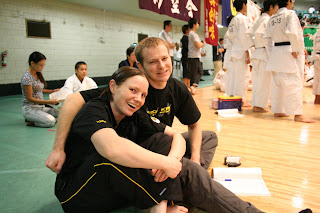 Carl and Louise, pulling 'genki' faces.
Carl and Louise, pulling 'genki' faces. The interns, Lee Minion Sensei and Arakawa Sensei.
The interns, Lee Minion Sensei and Arakawa Sensei.
Group Victory! That's Dr. Hideo Takagi in the center.
So, a good result for Shiramizu, and a very good experience for me; not just with the tournament but also meeting new people and building new friendships both here and in England. After the tournament, I headed out with the England squad and Louise one last time, where we saw Louise depart for the next part of her adventures and also saw off a couple of beers, drinking a toast to the last couple of weeks (and of course, our success and endeavors!).










